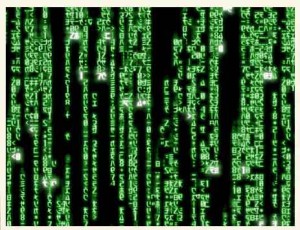This is a tiny followup of a previous post on nonlinear formulas in linear algebra. Let us consider a block matrix \( {M} \) of size \( {(n+m)\times(n+m)} \) of the form
\[ M= \begin{pmatrix} A & B \\C & D \end{pmatrix} \]
where \( {A,B,C,D} \) are \( {n\times n} \), \( {n\times m} \), \( {m\times n} \), \( {m\times m} \). If \( {D} \) is invertible then
\[ \det(M)=\det(A-BD^{-1}C)\det(D). \]
This follows immediately from the identity (mentioned in Wikipedia)
\[ \begin{pmatrix} A & B \\ C & D \end{pmatrix} \begin{pmatrix} I & 0 \\ -D^{-1}C & I \end{pmatrix} = \begin{pmatrix} A-BD^{-1}C & B \\ 0 & D \end{pmatrix} \]
(the determinant of a block triangular matrix is the product of the determinants of its diagonal blocks). If \( {m=n} \) and if \( {C},{D} \) commute then \( {\det(M)=\det(AD-BC)} \). Note that \( {A-BD^{-1}C} \) is the Schur complement of \( {A} \) in \( {M} \). Similar formulas are derived in arXiv:1112.4379 for the determinant of \( {nN\times nN} \) block matrices formed by \( {N^2} \) blocks of size \( {n\times n} \).
7 Comments